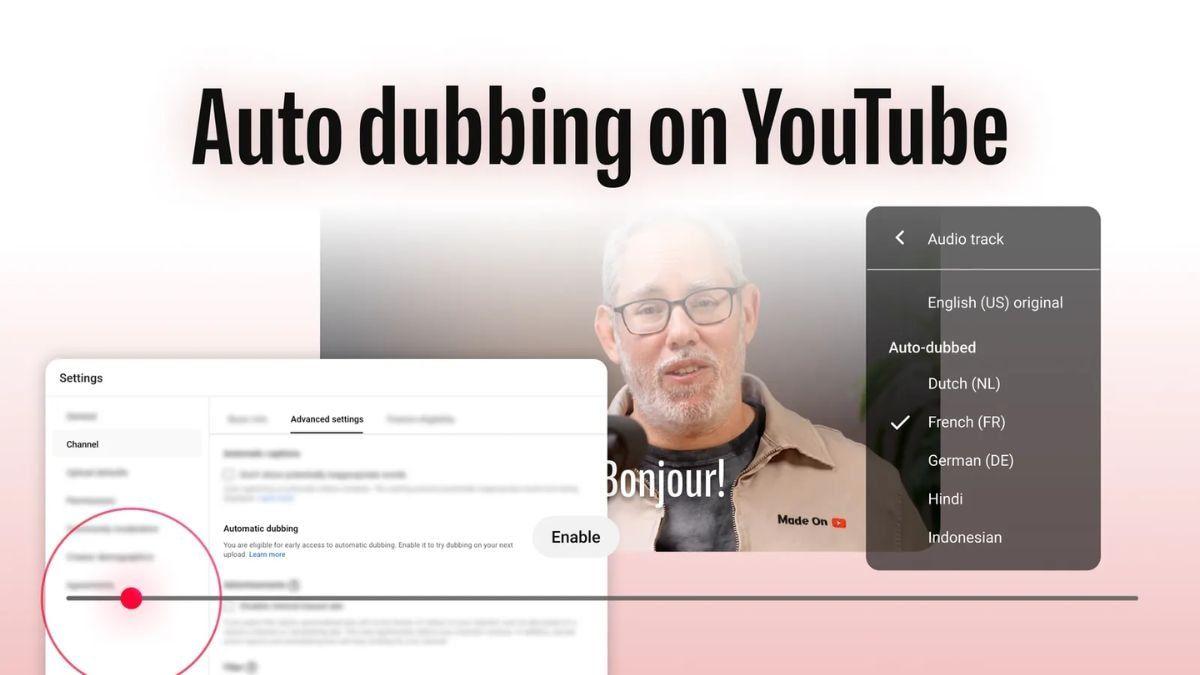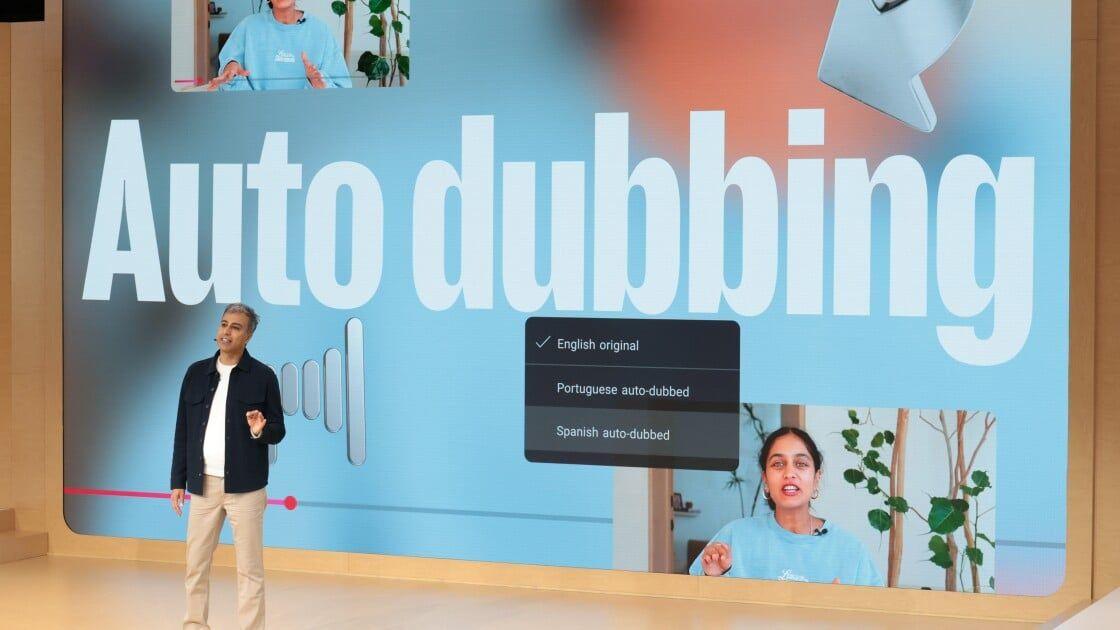YouTube Expands AI-Powered Auto-Dubbing Feature to Knowledge and Information Channels
4 Sources
4 Sources
[1]
YouTube's new audio dubbing tool automatically translates videos to other languages
This clever tool makes your content available to non-English speakers and vice versa - and everything happens automatically. If you're a YouTube creator, your audience just got wider. If you're a YouTube viewer, you're about to get access to a lot more content. The video streaming site has unveiled a new audio dubbing tool that automatically creates alternative audio tracks in different languages. Also: This new YouTube tool adds AI backgrounds to your videos instantly - for free YouTube's new dubbing tool takes English audio and automatically dubs a French, German, Hindi, Indonesian, Italian, Japanese, Portuguese, and Spanish track. A video in any of those languages will receive an English dub. The voice is slightly robotic for videos translated to English but still perfectly understandable. Creators with access to the tool don't need to do anything extra. YouTube will automatically detect the original language and create translated tracks. If you want to see your dubbed videos, you can find them in the Languages section of YouTube Studio. You can listen to the dubs to check if you're happy with how they sound. If you're not, you can delete any dubs you don't like. Also: This AI image generator that went viral for its realistic images gets a major upgrade The tool is only available for knowledge and information-focused channels involved in the YouTube Partner Program. If you have the option, you'll see it under advanced settings. YouTube says it's expanding to other categories soon. To change the audio on a video you're watching, look for the "auto-dubbed" label. Click the settings gear and look for "audio track". Click that setting and you'll see the option to hear the video in its original language or with translated audio. YouTube says it will continue working with Google DeepMind and Google Translate to create more accurate, expressive, and natural dubs. Also: Spotify Wrapped arrives - now with an AI podcast all about your year in music Future updates will create tracks that mimic your tone and emotions, and even the ambience of your surroundings.
[2]
YouTube finally rolls out AI dubbing to eliminate language-limited content
YouTube Premium is getting a big price hike internationally Summary YouTube has rolled out a new AI-powered dubbing feature that automatically translates and dubs videos into multiple languages. Creators can review and publish these dubbed versions. Viewers can select their preferred language from the video's settings. This feature expands the reach of content creators and makes YouTube a more inclusive platform. ✕ Remove Ads Back in June of 2023, YouTube announced that it is testing out an AI-enabled dubbing feature to help users better understand videos with dialogue in a foreign language. Now, one-and-a-half years later, the feature is finally rolling out. Powered by the team from Aloud, a dubbing service that began as an experiment under Google's in-house Area 120 incubator, the AI tool aims to break language barriers when it comes to content, making videos with verbal dialogue in specific languages more accessible to the global audience. Related Google's Area 120 wants to make it easy to dub videos into new languages Easy as uno, dos, tres, catorce Posts ✕ Remove Ads The streaming giant highlighted the new feature in a blog post, highlighting three specific videos. One that's been dubbed from French to English, one from Hindi to English, and one that is available in a total of nine languages, including English (original), Hindi, Portuguese, Spanish, Japanese, Italian, German, French, and Indonesian. It's worth noting that the feature is available to all creators, it's just that YouTube decided to highlight these specific videos. Of course, as you'd expect, the dubbed audio doesn't lip-sync, but it still does a good enough job of accurately dubbing, even in cases of fast-spoken conversations, as highlighted in a separate cooking video that I found. Automatic dubbing is currently available to some of your favorite creators that are part of the YouTube partner Program and make videos "focused on knowledge and information." The streaming giant indicated that the feature will soon expand to other types of content soon. How does it work? ✕ Remove Ads For viewers, finding dubs is as simple as tapping on the cogwheel icon and looking for an "Audio Track" option. This denotes if the video is available to watch in more than one language. Another way to check is to expand the video's description -- if it has a dedicated section that reads "Auto-dubbed" under the "How this content was made" section, it means that the video is available in more than one language. For creators, on the other hand, the dubbing process is completely automated -- and it is going to be enabled for you by default. The streaming giant highlighted that creators can continue uploading their videos as usual, and YouTube's AI tool will automatically generate dubbed versions for it. For reference, if your video's original audio is in English, it will be dubbed into French, German, Hindi, Indonesian, Italian, Japanese, Portuguese, and Spanish. Alternatively, if your video is in any of the other mentioned languages, it will be dubbed into English. Creators then have the option to review the dubs within YouTube Studio, alongside an option to unpublish and delete certain or all dubs. ✕ Remove Ads In the few examples shared by YouTube, the dubbed voice's tonality accurately represents the original speaker, though the streaming giant warned that the technology is still nascent, and it might not always be perfect.
[3]
YouTube Expands Auto Dubbing to Knowledge and Information Channels
YouTube plans to roll out "Expressive Speech" with future updates YouTube is expanding its auto dubbing feature to knowledge and information-focused content, it announced on Tuesday. The video streaming platform first announced this feature at VidCon last year and it leverages artificial intelligence (AI) technology developed by Aloud -- Google's in-house Area 120 incubator. As the name suggests, auto dubbing can automatically transcribe and translate YouTube videos from English to other dialects and vice versa, helping creators engage viewers who don't speak the same language by transcending language barriers. YouTube detailed the expanded availability of its AI-powered auto dubbing feature in a blog post. The Google-owned platform says that hundreds of thousands of YouTube channels that are part of the YouTube Partner Program which focus on knowledge and information will be able to take advantage of this feature. Creators who make videos in English can get them auto dubbed into French, German, Hindi, Indonesian, Italian, Japanese, Portuguese, and Spanish. Meanwhile, if the video is in any of the aforementioned languages, it will get dubbed into English. Videos dubbed using this feature will appear with a auto-dubbed label. Viewers can choose to listen to the original audio by using the track selector. To use this feature, no special steps are required. Creators simply need to upload videos and YouTube will automatically detect its language and dub it in other supported languages. Dubbed videos can be viewed in the YouTube Studio in the Languages section. Creators will have control over the dub and they can choose to unpublish or delete dubs that are not up to their liking, as per the platform. The company admits that there may be cases when the translation might stray a bit far or the dubbed voice does not match the original speaker. However, it emphasises that users can always submit feedback for the feature's improvement. It is working towards bringing more accurate, expressive, and natural speech in dubs via a feature called 'Expressive Speech' that was previewed at the Made on YouTube event in September.
[4]
Is YouTube AI Auto-Dubbing Expanding: Find the Shocking News
YouTube has created the 'Auto-Dubbed' label to indicate dubbed audio tracks. Alternatively, users can switch the track selector to hear the video in its original language. YouTube is partnering with and Google Translate to make the audio more accurate and descriptive. Dubbed videos will hence sound more natural, bringing forth the speaker's original tone and conveying better meaning. YouTube is further expected to support more kinds of content in the future. Thus, the YouTube AI Auto Dubbing feature showcases the company's commitment to making its content more accessible and representative of a global audience.
Share
Share
Copy Link
YouTube has rolled out an AI-powered auto-dubbing feature that automatically translates and dubs videos into multiple languages, making content more accessible to a global audience.

YouTube Introduces AI-Powered Auto-Dubbing Feature
YouTube has unveiled a groundbreaking AI-powered auto-dubbing feature, expanding its availability to knowledge and information-focused channels within the YouTube Partner Program. This innovative tool automatically translates and dubs videos into multiple languages, breaking down language barriers and making content more accessible to a global audience
1
.How It Works
The auto-dubbing process is entirely automated for creators. When a video is uploaded, YouTube's AI tool detects the original language and generates dubbed versions in supported languages. For English content, dubs are created in French, German, Hindi, Indonesian, Italian, Japanese, Portuguese, and Spanish. Videos in these languages are dubbed into English
2
.Viewers can access dubbed versions by clicking the settings gear icon and selecting the "Audio Track" option. Dubbed videos are marked with an "Auto-dubbed" label in the video description
3
.Creator Control and Quality Assurance
Creators have the ability to review and manage dubbed versions of their content within YouTube Studio. They can listen to the dubs and choose to unpublish or delete any that don't meet their standards. This level of control ensures that creators maintain the quality and integrity of their content across languages
1
.Related Stories
Technology and Future Improvements
The auto-dubbing feature is powered by technology developed by Aloud, a project from Google's Area 120 incubator. YouTube is collaborating with Google DeepMind and Google Translate to enhance the accuracy and expressiveness of the dubbed audio
4
.Future updates aim to introduce "Expressive Speech," which will create dubs that better mimic the original speaker's tone, emotions, and even ambient sounds. This advancement promises to make dubbed content sound more natural and engaging
1
.Impact on Content Creation and Consumption
This feature significantly expands the potential reach of content creators, allowing them to connect with audiences across language barriers. For viewers, it opens up a vast library of previously inaccessible content, enriching the YouTube experience for non-English speakers and vice versa
2
.As YouTube continues to refine and expand this technology, it demonstrates a commitment to creating a more inclusive and globally accessible platform. The company plans to extend the auto-dubbing feature to other content categories in the future, further breaking down language barriers in digital content consumption
3
.References
Summarized by
Navi
[4]
Related Stories
YouTube Expands AI-Powered Auto-Dubbing Feature for Global Content Accessibility
22 Nov 2024•Technology

YouTube expands auto-dubbing feature to all creators with AI-powered voice and lip sync upgrades
05 Feb 2026•Technology

YouTube's AI Lip-Sync Technology: Revolutionizing Auto-Dubbing for Global Content
14 Oct 2025•Technology

Recent Highlights
1
ByteDance's Seedance 2.0 AI video generator triggers copyright infringement battle with Hollywood
Policy and Regulation

2
Demis Hassabis predicts AGI in 5-8 years, sees new golden era transforming medicine and science
Technology

3
Nvidia and Meta forge massive chip deal as computing power demands reshape AI infrastructure
Technology





